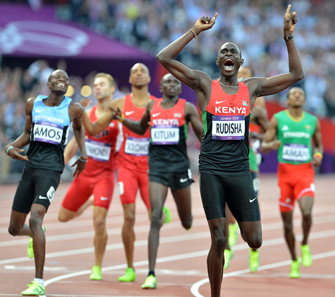
(FinalCall.com) – After Brazil hosts the Olympics in 2016 what continent will have the distinction of never having hosted the Games? Here’s a hint, historically its distance running success in the Olympics is unparalleled and it has the first double amputee to reach the semifinals. Give up? The continent is Africa and the double amputee is South Africa’s Oscar Pistorius.
Various reports name South Africa as the only African country with the infrastructure and resources necessary to host such a monumental event. But they then go on to highlight “major weaknesses” that would prevent South Africa’s selection including the country’s “high crime rate.”
There appears to be a double standard. Various nations “competing” with South Africa touted its high crime rate as a reason to disqualify it from sponsoring the Games. But Chicago’s increasing violent crime rate didn’t preclude it from putting in a bid to host the 2012 Olympics. And though Chicago didn’t win the bid a high crime rate never appeared to be a determining factor.
To the South African naysayers, the precedence for Olympic sponsorship has already been set. This occurred when SA confounded the skeptics, according to the Christian Science Monitor, which predicted a high crime rate and inept management of the world’s largest sporting event, the 2010 World Cup.

“Three hundred thousand foreign visitors came to these games, and while not all of them were happy with their team’s performance–this isn’t kindergarten, where everyone comes out a winner–most of them have gone home safe and sound, and impressed with the host nation,” reported the Monitor.
In 2005 International Olympic Committee President Jacques Rogge urged African nations to bid for the 2016 Olympics. In his statement he suggested an African city would stand a strong chance of winning if it met key requirements.
In the same year Kenya announced its intention to put in a bid, likely for its capital Nairobi. According to published reports, this would make it “only the third African country (after South Africa and Egypt) to launch a serious bid for the Games.”
The last time Kenya sponsored such a large event was in 1987 when Nairobi played host to the All-Africa Games.
Cape Town in South Africa was on the candidate city short list for the 2004 Olympics. Given South Africa’s success with the World Cup there is growing optimism of its prospects of hosting the Games in the near future.
Africa not having a track record in hosting the summer Olympics hasn’t dampened its East African middle-distance and distance runner’s dominance. On his blog, Dr. Dean Carey cited Ethiopian Tirunesh Dibaba, who became “the first women in history to retain the Olympic women’s 10,000 m race title.” The next day (Saturday, Aug. 4) Somali-born British athlete Mo Farah won the gold in the men’s 10,000 meter race.
Other East African successes, sited by Dr. Carely, included Ethiopian Tiki Gelana, the first to cross the finish line in the women’s marathon and Kenya’s Ezekiel Kemboi winning the men’s 3000 meter steeplechase.
“So successful have been Kenya and Ethiopia in creating world-class athletes that they have produced a surplus for export.” These include Kenyan born 800 meter specialist Wilson Kipketer (who changed his nationality and ran for Denmark) and Ethiopian-born 800 meter specialist Zenebech Tola, now named Maryam Yusuf Jamel, who represented Bahrain.
The Olympics haven’t always been as idealized and sacrosanct and depoliticized, as they are currently, reported The Atlantic magazine. In fact in 1976, just days before the Olympics, 28 African countries announced a boycott the summer games in Montreal.
According to The Atlantic magazine’s Armin Rosen, “The boycotters said they refused to participate alongside New Zealand, whose national rugby team had embarked on a controversial tour of apartheid South Africa that summer, in defiance of an informal but widely observed international athletics embargo on the country.”
To add insult to injury in June of the same year the South African government massacred over 350 anti-apartheid protesters during the infamous Soweto uprising. The message the boycotters were clearly sending was that it wasn’t enough to just exclude the apartheid regime from the Olympics, but they “considered it unacceptable for any country or any international sporting organization to legitimize the South African government in any way…”
An essay in the book “Onward to the Olympics: Historical Perspectives on the Olympic Games,” sports historian Courtney Mason summed up the effects of the boycott. “The 1976 boycott not only generated international consciousness for the anti-apartheid movement, but also indirectly induced social and political change.”
Britain’s minister for sports and the Olympics Hugh Robertson says Africa is more than capable to host future Games. He was speaking after completing a whirlwind morning tour around the continent via the Africa Village, situated in London’s Kensington Gardens.
“There is a real empathy and feeling for sports across Africa,” Robertson said. “There is no reason why it shouldn’t happen in the future.”
After Brazil hosts the Olympics in 2016, Africa will be the only continent not to have done so. There have been talks of bidding by Nairobi (Kenya) and Durban (South Africa) for the 2020 games, but neither proposal has materialized. Tokyo, Istanbul and Madrid are the three official candidates.
(Jehron Muhammad writes from Philadelphia and can be reached at [email protected].)












